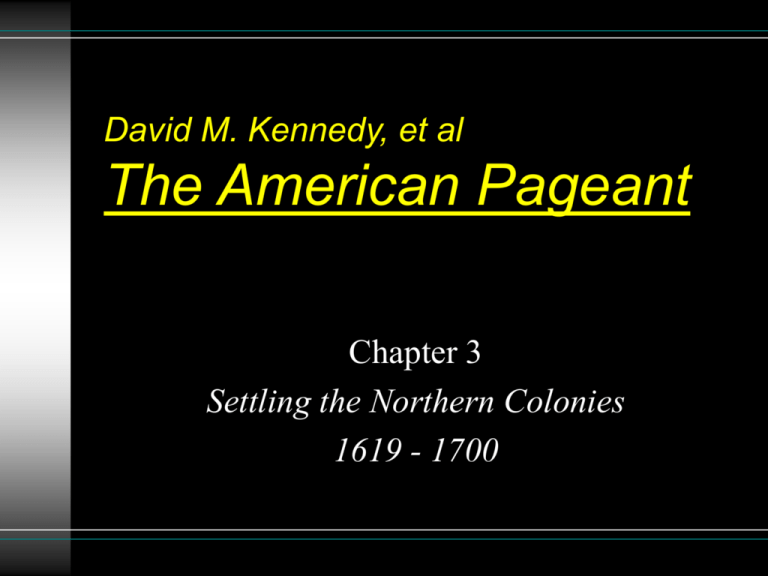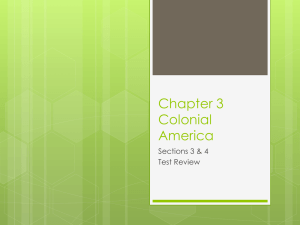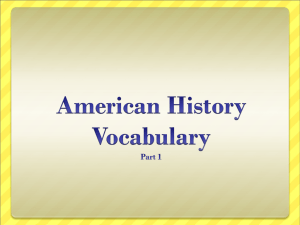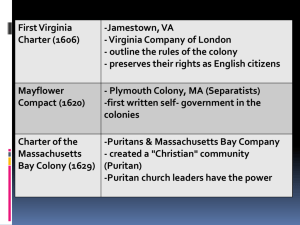APUS 3 - SHSBarbour
advertisement

David M. Kennedy, et al The American Pageant Chapter 3 Settling the Northern Colonies 1619 - 1700 I. Calvinism – John Calvin in Switzerland A. Predestination 1. God had determined who was going to heaven (the elect) and hell since the beginning of creation 2. Good works could not get you into heaven B. English Calvinists were called Puritans II. Separatists Puritans (Pilgrims) left England (1608) A. Temporary stay in Holland B. Arrived off coast of New England Nov. 1620 C. May Flower Compact – agreement for self government according to the will of the majority D. Established Plymouth Colony 1. Only 44 of 102 survived 1st winter 2. Next fall = 1st Thanksgiving 3. William Bradford 4. Economy = fur (beaver), fish, & lumber Notice: thatched roofs; no paint, glass, or masonry III. Non-Separatist Puritans fled English persecution (1629) A. Formed Massachusetts Bay Company 1. Founded Massachusetts Bay Bible Colony & Boston 2. Came well prepared and financed family units & entire villages 3. John Winthrop – leader 4. 5. 6. Economy – fishing, ship building and fur trading Established the Congregational church & a representative assembly purpose of government = enforce God’s laws The Great English Migration (1630-1642) B. Religious intolerance 1. Roger Williams a. Challenged authority of the government to regulate the church – banished b. Established new colony of Rhode Island (1636) 1. Freedom of religion (for all) 2. Separation of church and state 2. Anne Hutchinson a. Challenged the concept of predestination b. Banished from MA IV. Bay Colony Expansion A. Connecticut – Thomas Hooker 1. Fundamental Orders of Connecticut – established a government democratically controlled by ‘substantial’ citizens B. New Haven 1. Sought to strengthen the church – state relationship 2. Harbor judges that kill a king’s father = not good PR New Haven absorbed by Connecticut by royal charter C. D. Maine 1. Founded by Sir F. Gorges 2. Sold by heirs to MA in 1677 New Hampshire 1. King assisted in maintaining independence from MA V. Indians resist Puritan expansion A. Pequot War - 1637 B. King Philip’s (Metacom) War (1675) 1. Slowed westward movement of New England settlers 2. Ended Indian threat to New England VI. New England unity A. New England Confederation – 1st attempt at colonial unity 1. Purpose a. Plan mutual defense against Indians, French, and Dutch b. Handle internal problems c. ‘Puritan only club’ 2. Charles II perceived this as a threat B. Dominion of New England (1686) 1. Union of all New England colonies 2. Created by England for defense & to enforce Navigation Laws 3. Governor – Sir Edmund Andros imposed restrictions on colonists – poorly received 4. Ended after the Glorious Revolution in England A demand for the surrender of Andros VII. Salutary Neglect A. Little interference from England in colonial matters B. Both England and the colonies prospered C. Roots of independence sal·u·tar·y adj. 1.Effecting or designed to effect an improvement; remedial: 2.Favorable to health; wholesome: a salutary climate. salutary advice. ne·glect tr.v. ne·glect·ed, ne·glect·ing, ne·glects 1. To pay little or no attention to; fail to heed; disregard: neglected their warnings. 2. To fail to care for or attend to properly: neglects her appearance. 3. To fail to do or carry out, as through carelessness or oversight: neglected to return the call. n. 1. The act or an instance of neglecting something. 2. The state of being neglected. 3. Habitual lack of care. VIII. New Netherlands (1623) A. Henry Hudson sailed for the Dutch West India Company and discovered the Hudson River valley B. Colony established as a company town to capitalize on the fur trade C. Aristocratic patroonships established D. Repressive colony Peter Stuyvesant The ‘wall’ of Wall Street IX. New Sweden (1638) A. Small Swedish colony established on the Delaware River (modern day PA, DE, & NJ) B. Taken over by Dutch in 1655 C. Legacy = log cabin D. All of New Netherlands and New Sweden via royal decree ~ violence ~ taken over by British in 1664 – renamed New York X. Pennsylvania (1664) – William Penn A. Established as a proprietary colony & safe haven for the Religious Society of Friends = Quakers B. C. D. PA ‘mass-marketed’ in Europe Attracted a diverse population – both a strength and weakness – which spurred rapid growth Delaware, East Jersey, and West Jersey were formed from ‘overflow’ Why were Quakers feared and prosecuted? QUAKERS CHURCH OF ENGLAND Equality and mass participation Hierarchy for religious, economic, and political power QUAKERS Simplicity & no state support CHURCH OF ENGLAND Westminster Abbey Power of the Church of England and the King QUAKERS Pacifism and liberal political beliefs ex – 1st group to advocate abolition of slavery Cooperation & peaceful coexistence with native Indians Tolerance of all immigrants and religions XI. Commonalities of the Middle Colonies (NY, NJ, PA, DE) A. Fertile soil & navigate rivers B. Economic diversification 1. Exported grain – ‘bread colonies’ of NY and NJ 2. Fur Trade – Hudson River in NY 3. Lumber and Shipbuilding 4. Farming 5. Merchant ports (New York & Philadelphia) C. More ethnically diverse population than New England & Southern colonies


